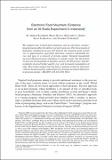Electronic Food Vouchers: Evidence from an At-Scale Experiment in Indonesia
Author(s)
Banerjee, Abhijit; Hanna, Rema; Olken, Benjamin A.; Satriawan, Elan; Sumarto, Sudarno
Download2023_Electronic_Food_Vouchers_aer.20210461.pdf (1.050Mb)
Publisher Policy
Publisher Policy
Article is made available in accordance with the publisher's policy and may be subject to US copyright law. Please refer to the publisher's site for terms of use.
Terms of use
Metadata
Show full item recordAbstract
We compare how in-kind food assistance and an electronic voucher-based program affect the delivery of aid in practice. The Government of Indonesia randomized across 105 districts the transition from in-kind rice to approximately equivalent electronic vouchers redeemable for rice and eggs at a network of private agents. Targeted households received 46 percent more assistance in voucher areas. For the bottom 15 percent of households at baseline, poverty fell 20 percent. Voucher recipients received higher-quality rice, and increased consumption of eggs. The results suggest moving from a manual in-kind to electronic voucher-based program reduced poverty through increased adherence to program design. (JEL H53, I18, I32, I38, O12)
Date issued
2023-02-01Department
Massachusetts Institute of Technology. Department of EconomicsPublisher
American Economic Association
Citation
Banerjee, Abhijit, Rema Hanna, Benjamin A. Olken, Elan Satriawan, and Sudarno Sumarto. 2023. "Electronic Food Vouchers: Evidence from an At-Scale Experiment in Indonesia." American Economic Review, 113 (2): 514-47.
Version: Final published version
ISSN
0002-8282
Keywords
Economics and Econometrics